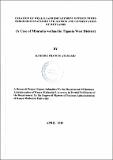| dc.contributor.author | Atanasio, Kithure Francis | |
| dc.date.accessioned | 2019-07-16T07:18:09Z | |
| dc.date.available | 2019-07-16T07:18:09Z | |
| dc.date.issued | 2010-04 | |
| dc.identifier.uri | http://repository.kemu.ac.ke:8080/xmlui/handle/123456789/574 | |
| dc.description.abstract | Generally wetlands have untapped potential which the society can tap to create wealth employment opportunities. Tapping these potentials requires collaboration of key players in wetland management who should work together in initiating enterprises and ventures which can create job opportunities. The study intended to elucidate the potential and economic opportunities found within Mbututia wetlands in Tigania west district with a view to analyze the said potential and it should be used to create wealth and job opportunities. During the said period of past and existing initiatives by community and stakeholders was analyzed through analyses of related literature on studies done in Meru and elsewhere with a view of trying to understand the values and potential of this wetland and trying to identify gaps in studies. Inputs (activities/contributions) from key players in wetlands management who are the community, the stakeholders and the donors formed independent variables of the study while output(wealth and job opportunities)arising from these inputs formed dependent variable. The researcher used hypothesis to test the relationship between these variables. Population of 203(registered members of CBOs of Mbututia wetland, formed the population of the study. A sample of 40 respondents was picked randomly which is equivalent to 20% of total population and was used as sample during the study. Descriptive research design was used where the researcher visited the population of interest in selected wetland to collect data. Simple random sampling design was used to le the population. This design was found appropriate because it enabled the researcher to get required and valuable information. The study used questionnaires as the main instrument in getting the information and collecting data from respondents. Both open and closed ended questions were used. This led the researcher to get enough information from respondents. The researcher used statistical package for social science (SPSS) to do the analyses and test. Descriptive statistics like mean, mode and standard deviation were used to summarize the data. Chi-square test was used to test hypothesis and particularly to find relationship between the variables under study. The presentations were made in form tables, pie charts and graphs. The study found out that there are several projects by CBO members on Mbututia westland and concluded that communities living within wetland areas can generate income create job opportunities through various economic activities on wetlands. The researcher also recommended that further study be carried out to establish values, potential and opportunities within wetlands in fighting poverty in our society. | en_US |
| dc.language.iso | en | en_US |
| dc.publisher | KeMU | en_US |
| dc.subject | Employment opportunities through sustainable utilization and conservation of wetlands | en_US |
| dc.title | Creation of Wealth and Employment Opportunities through Sustainable Utilization and Conservation of Wetlands | en_US |
| dc.type | Thesis | en_US |

